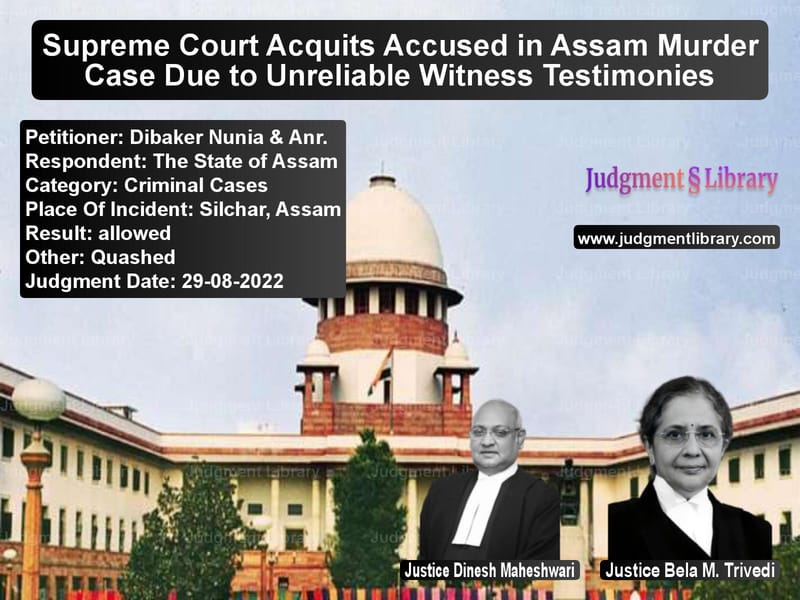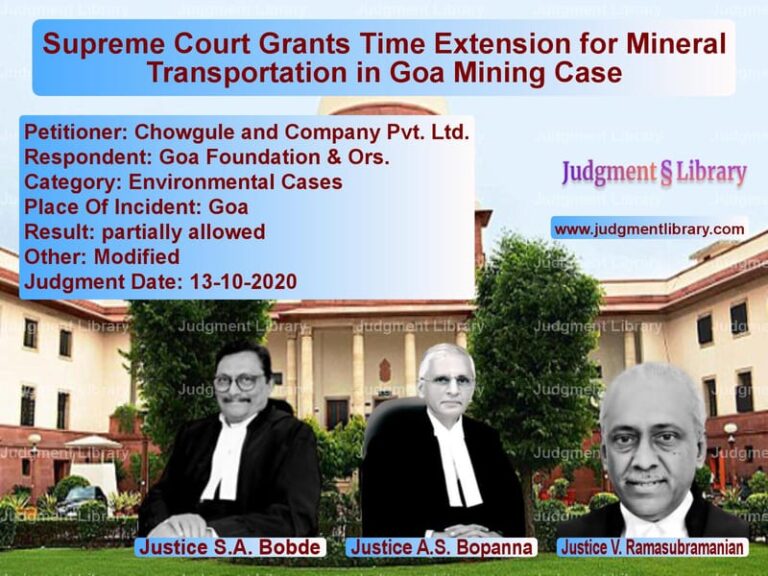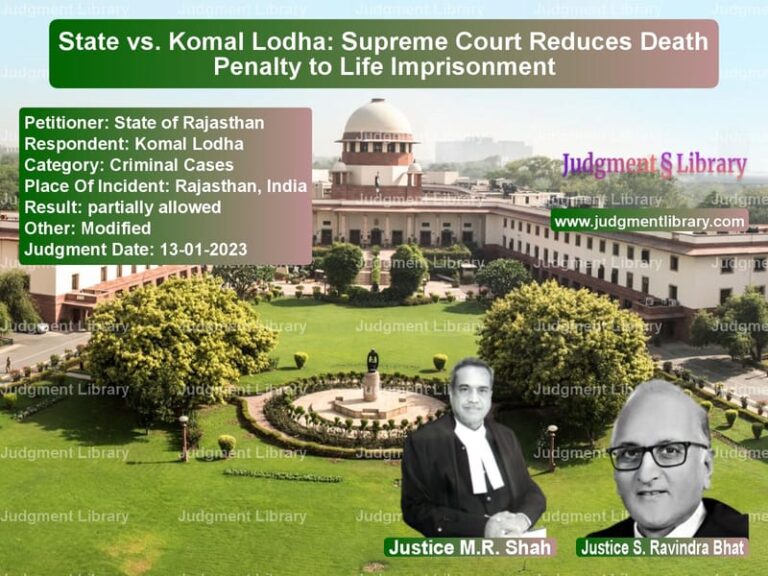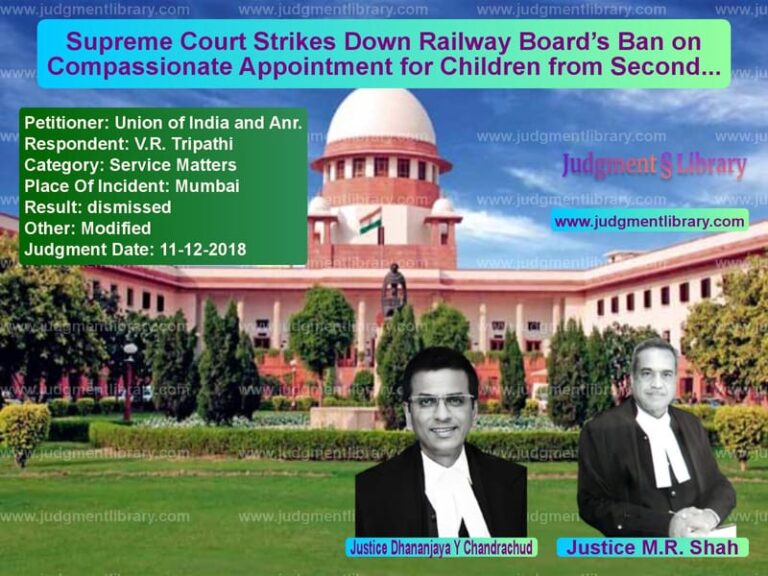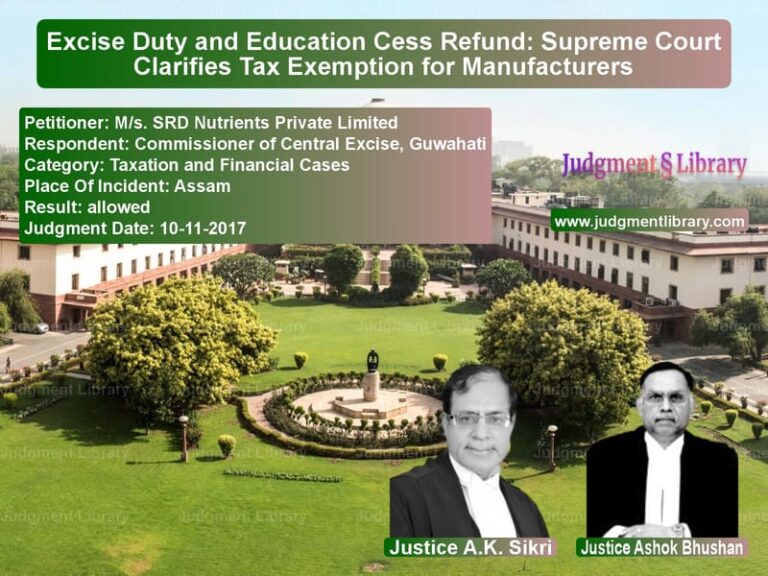Supreme Court Acquits Accused in Assam Murder Case Due to Unreliable Witness Testimonies
The Supreme Court of India, in the case of Dibaker Nunia & Anr. vs. The State of Assam, delivered a landmark judgment on August 30, 2022, acquitting two appellants who had been convicted of murder by the Trial Court and whose conviction had been upheld by the Guwahati High Court. The bench comprising Hon’ble Mr. Justice Dinesh Maheshwari and Hon’ble Ms. Justice Bela M. Trivedi found significant inconsistencies in the testimonies of prosecution witnesses, leading to the decision to overturn the prior convictions.
The case revolved around the alleged murder of one Amar Tanti, for which the appellants had been convicted under Sections 302/34 of the Indian Penal Code (IPC). The Supreme Court’s judgment brings to light crucial aspects of the legal principle of ‘beyond reasonable doubt’ and reinforces the importance of credible and consistent evidence in securing a conviction.
Case Background
The case dates back to October 1, 1999, when an FIR was filed at the Ghungoor Police Outpost by PW-1, Amrit Tanti, the brother of the deceased, Amar Tanti. He alleged that the appellants, Dibakar Nunia and Babul, had assaulted Amar Tanti on the evening of September 30, 1999. According to the FIR, the deceased was found lying in front of a Congress Party election office, near a shop owned by PW-5, Joynarayan. He reportedly succumbed to multiple injuries inflicted by the accused.
The case was subsequently investigated, and the two accused were arrested and charged under Sections 302/34 IPC. The prosecution primarily relied on the testimonies of PW-2 (Sukhram), the father of the deceased, and PW-3 (Menoka Tati), his stepmother, both of whom were claimed to be eyewitnesses to the murder.
Arguments Presented by the Prosecution
The prosecution contended that the appellants had attacked the deceased with sharp weapons, resulting in his death. Their case rested on the following key testimonies:
- PW-2 (Sukhram, father of the deceased): He claimed that he and his wife were returning home around 8 PM when they heard their son’s cries. On reaching the scene, they saw the accused assaulting him with a dao (a sharp weapon). He stated that Babul overpowered his son while Dibakar struck him repeatedly. Overwhelmed by the sight of blood, he lost consciousness.
- PW-3 (Menoka Tati, stepmother of the deceased): She corroborated PW-2’s account, stating that she saw Babul holding the deceased while Dibakar assaulted him. She emphasized that the incident was well-lit by streetlights, allowing clear identification of the accused.
- PW-7 (Dr. Homeswar Sharma): The medical examiner testified that the deceased had suffered multiple incised wounds, including a deep cut to the neck that severed his cervical vertebrae.
Defense Arguments
The defense challenged the prosecution’s case on several grounds:
- The delay in filing the FIR raised suspicions regarding the authenticity of the accusations.
- The key prosecution witnesses (PW-2 and PW-3) acted in an unnatural manner by allegedly witnessing the murder yet going home, having dinner, and sleeping before reporting the incident.
- None of the independent witnesses supported the prosecution’s case.
- The accused were falsely implicated due to personal animosity.
Observations by the Supreme Court
The Supreme Court noted several inconsistencies and contradictions in the prosecution’s case. The bench observed:
“The findings in question are based essentially on the testimony of PW-2 and PW-3, who were alleged to be the eyewitnesses to the incident. No other independent witness has testified in support of the prosecution case.”
The Court found it highly unnatural that the deceased’s parents, after allegedly witnessing their son’s brutal murder, would return home, have dinner, and sleep before informing anyone about the incident.
“As per the assertion of PW-2 and PW-3, they had seen their son being assaulted by two persons with a weapon. PW-2 had allegedly fallen unconscious after seeing the blood oozing from the body of his son. In that situation, it is difficult to appreciate that these witnesses would go home, take a meal, and sleep without bothering about the welfare of their injured son.”
The Court also pointed out that several independent witnesses, including PW-4, PW-5, PW-8, and PW-9, failed to support the prosecution’s version of events.
Final Judgment
After reviewing the evidence, the Supreme Court concluded that the prosecution had failed to prove the guilt of the accused beyond a reasonable doubt. The Court emphasized that:
“It remains trite that in such a criminal case, the prosecution is expected to prove its case and substantiate the charge beyond reasonable doubt. A reasonable doubt is not a mere possible doubt but a fair doubt based upon reasons and common sense.”
Accordingly, the Court set aside the judgments of both the Trial Court and the High Court, stating:
“The impugned judgment and order dated 17.09.2009, as passed by the Guahati High Court in Criminal Appeal No. 79 of 2006, as also the judgment and order dated 16.02.2006, as passed by the Sessions Judge, Cachar at Silchar in Sessions Case No. 37 of 2003, are set aside; and the appellants are acquitted as such. If the appellants are in custody, they be released immediately.”
Conclusion
The Supreme Court’s decision in Dibaker Nunia & Anr. vs. The State of Assam reinforces the fundamental principle of criminal jurisprudence—that an accused must be convicted only if their guilt is proven beyond a reasonable doubt. The ruling highlights the importance of reliable eyewitness testimony and warns against basing convictions on testimonies that lack credibility.
This judgment serves as a reminder that courts must scrutinize evidence meticulously, particularly in cases involving serious charges like murder. It also underscores the necessity for law enforcement agencies to ensure thorough investigations before presenting a case in court.
Petitioner Name: Dibaker Nunia & Anr..Respondent Name: The State of Assam.Judgment By: Justice Dinesh Maheshwari, Justice Bela M. Trivedi.Place Of Incident: Silchar, Assam.Judgment Date: 29-08-2022.
Don’t miss out on the full details! Download the complete judgment in PDF format below and gain valuable insights instantly!
Download Judgment: dibaker-nunia-&-anr.-vs-the-state-of-assam-supreme-court-of-india-judgment-dated-29-08-2022.pdf
Directly Download Judgment: Directly download this Judgment
See all petitions in Murder Cases
See all petitions in Bail and Anticipatory Bail
See all petitions in Custodial Deaths and Police Misconduct
See all petitions in Judgment by Dinesh Maheshwari
See all petitions in Judgment by Bela M. Trivedi
See all petitions in allowed
See all petitions in Quashed
See all petitions in supreme court of India judgments August 2022
See all petitions in 2022 judgments
See all posts in Criminal Cases Category
See all allowed petitions in Criminal Cases Category
See all Dismissed petitions in Criminal Cases Category
See all partially allowed petitions in Criminal Cases Category

